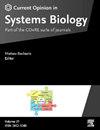合成生物学中的群体感应:综述
IF 3.4
Q2 BIOCHEMISTRY & MOLECULAR BIOLOGY
引用次数: 26
摘要
在自然界中,群体感应是细菌群体用来与自己的物种或跨物种沟通以协调行为的机制之一。在过去的20年里,合成生物学家已经认识到群体感应的显著特性,可以构建对种群密度敏感的遗传回路。这使得在设计动态的、协调的、有时是多细胞的系统用于代谢工程中的生物生产和合成生物学中增加的时空复杂性方面取得了进展。在这篇综述中,我们强调了最近的工作集中在使用群体感应来设计细胞-细胞行为。本文章由计算机程序翻译,如有差异,请以英文原文为准。
Quorum sensing in synthetic biology: A review
In nature, quorum sensing is one of the mechanisms bacterial populations use to communicate with their own species or across species to coordinate behaviours. For the last 20 years, synthetic biologists have recognised the remarkable properties of quorum sensing to build genetic circuits responsive to population density. This has led to progress in designing dynamic, coordinated and sometimes multicellular systems for bioproduction in metabolic engineering and for increased spatial and temporal complexity in synthetic biology. In this review, we highlight recent works focused on using quorum sensing to engineer cell–cell behaviour.
求助全文
通过发布文献求助,成功后即可免费获取论文全文。
去求助
来源期刊

Current Opinion in Systems Biology
Mathematics-Applied Mathematics
CiteScore
7.10
自引率
2.70%
发文量
20
期刊介绍:
Current Opinion in Systems Biology is a new systematic review journal that aims to provide specialists with a unique and educational platform to keep up-to-date with the expanding volume of information published in the field of Systems Biology. It publishes polished, concise and timely systematic reviews and opinion articles. In addition to describing recent trends, the authors are encouraged to give their subjective opinion on the topics discussed. As this is such a broad discipline, we have determined themed sections each of which is reviewed once a year. The following areas will be covered by Current Opinion in Systems Biology: -Genomics and Epigenomics -Gene Regulation -Metabolic Networks -Cancer and Systemic Diseases -Mathematical Modelling -Big Data Acquisition and Analysis -Systems Pharmacology and Physiology -Synthetic Biology -Stem Cells, Development, and Differentiation -Systems Biology of Mold Organisms -Systems Immunology and Host-Pathogen Interaction -Systems Ecology and Evolution
 求助内容:
求助内容: 应助结果提醒方式:
应助结果提醒方式:


